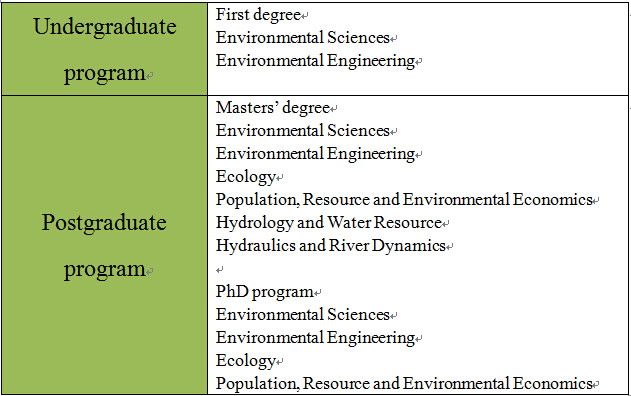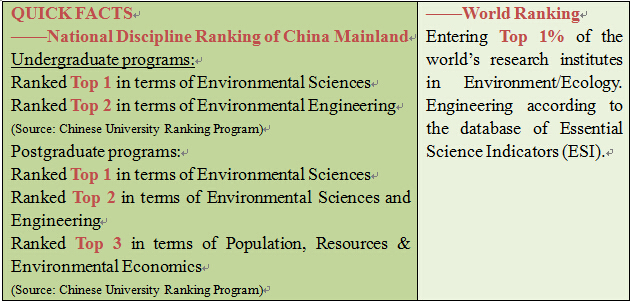
Degree programs
Our School offers an undergraduate program in environment sciences and environmental engineering with exciting programs under development.
At the graduate level, interdisciplinary collaborative programs in Environmental Sciences, Environmental Engineering, Ecology, Population, Resources & Environmental Economics, Hydrology and Water Resource, as well as Hydraulics and River Dynamics, are offered.
It offers over 100 courses including 20 taught in English at either Undergraduate (first degree) or Postgraduate level (Masters and PhD Research programs) coupled with a thriving research culture across a wide range of environment-related disciplines.
Many of our courses combine academic rigor, laboratory work, field trips within our stunning region, and professional experience through industry internships for a well-rounded education and enhanced career opportunities. Many of our units have flexible study options, with some courses available by distance education.
In addition, the school is also home to post-doctoral research programs in Environmental Sciences and Engineering. The school has cultivated a large number of academic professionals, many of whom have made significant contributions to the development of environmental protection in China.


Undergraduate programs
The School of Environment is one of the first batch of bases which engage in environmental scientific research and education in colleges and universities approved by the Ministry of Education. Environmental sciences is a key state discipline, and environmental engineering is considered to be a key discipline in Beijing. Both environmental sciences and engineering disciplines are national doctorate first-rate disciplines. The School offers four Programs for Doctoral Degrees: environmental sciences, environmental engineering, environmental ecology, and population, resources and environmental economics; six Programs for Master’s Degrees: environmental sciences, environmental engineering, environmental ecology, population, resources and environmental economics, hydrology and water resources, and hydraulics and river dynamics; and one Master’s Degree program for Engineering, namely environmental engineering. In addition, the School can count on the State Key Laboratory of Water Environment Simulation and the Key MOE Laboratory of Water and Sediment, as well as a postdoctoral research station of environmental sciences and engineering. According to the 2011 Evaluation of Chinese Universities, our environmental sciences undergraduate program is Level A++, ranking number one nationwide, and the environmental engineering undergraduate program is Level A++, ranking second.
The School has one set of best teaching materials in the national regular higher education, two national-level best course, one national bilingual teaching demonstration course, two Beijing best courses, and seven school-level best courses. Moreover, it has four productive practice bases outside the school, and six basic and professional laboratories. The School encourage undergraduates to do scientific research, so that students can touch upon practical environmental problems as early as possible, and seek problem-solving approaches in experiment and practice. As a result, the level of their scientific research improves in an obvious fashion. The School was the first to implement the “short-hour” teaching program to improve its quality. Furthermore, the Professors’ Comments organized by the School are usually the first enlightening lesson which freshmen receive after admission. The School actively encourages teaching reform and course updates. For Environmental Sociology, the synchronous video teaching was realized successfully with six well-known international universities including US Cornell University.
The School has set up two departments, the Environmental Sciences, Policies and Management Department and the Environmental System Engineering Department, and two undergraduate programs for environmental sciences and environmental engineering. Depending on its advantages in scientific research, the School lays emphasis on a combination of theoretical and practical teaching, and strengthens the experimental teaching links and the students’ operational ability by taking innovative and research-based talent cultivation as the educational target.
1. Environmental Sciences
Program Objectives
The undergraduate program in environmental sciences provides students with a broad fundamental education relating to environment science and its application. The students will be provided with fundamental and extensive knowledge of mathematics, physics, chemistry and environmental science, as well as experimental skills.
Program Outcomes
At completion of this program, students will have:
l. a high awareness of environmental protection
2. a theoretical and technical knowledge of environmental science and management
3. the ability to conduct research, development and management in the environmental field
Program Length: 4 years
Credit Requirement: 160.5 units
Degree Received: Bachelor of Science
2. Environmental Engineering
Program Objectives
The undergraduate program in environment engineering provides students with a broad fundamental education relating to environmental science & engineering and its application. The students will be provided with a fundamental and extensive knowledge of mathematics, physics, chemistry and environmental sciences & engineering, as well as experimental skills.
Program Outcomes
At the completion of this program, students will have:
1. a deep understanding of environmental technology
2. the theoretical and technical knowledge of environmental engineering
3. the ability to conduct research, development and design in the environmental field
Program Length: 4 years
Credit Requirement: 165.5 units
Degree Received: Bachelor of Engineering
Graduates’ choice after graduation: About 30% of graduates go to well-known European and American universities for further study, and 50% of them enter our School and other key universities and work hard as Master Degree candidates. The best students are kept and go through their undergraduate, master’s and doctoral degree programs in our school. The others mostly get a job in the administrative departments of environmental protection, water conservancy, municipal administration, and the forestry and planning departments, as well as such technical units as institutions of higher learning, scientific research institutions, design institutes, foreign companies and major Chinese industries.
Overview of postgraduate education
As one of the earliest postgraduate units engaging in environmental disciplinary studies in China, Beijing Normal University set up a pilot master in environmental sciences in 1982, a doctoral station for environmental sciences in 1991 and an environmental engineering pilot master in 2001. Its environmental sciences was awarded the national-level key discipline in 2002. Environmental sciences and engineering became a national-level doctorate program in 2003. A doctoral station for environmental engineering was established in 2004, and environmental engineering was rated as the key Beijing discipline in 2008. Through nearly ten years of development, the BNU School of Environment has created a postgraduate unit with a high international influence and which is at the top of some of its programs both at home and abroad. In the ranking of engineering disciplines among Chinese universities’ postgraduate schools, the environmental sciences of BNU is rated as Level A++, ranking first nationwide; the first-level discipline of environmental sciences and engineering is also Level A++, ranking second nationwide; the second-level discipline of population, resources and environmental economics is also at Level A++, taking the third place; the second-level discipline of environmental engineering is at Level A+, taking the seventh place. In the ranking of 2009-2012 ESI world research institutions, environmental sciences of BNU (Environmental/ecological and engineering) was ranked in the top 1% of research institutions in its field.
Enrollment of postgraduates: BNU’s School of the Environment includes three doctorate programs: environmental sciences, environmental engineering, and population, resources and environmental economics; five master degree programs: environmental sciences, environmental engineering, population, resources and environmental economics, hydrology and water resources, and hydraulics and river dynamics; and one master degree program of environmental engineering. Every year, BNU’s School of the Environment recruits 40—50 doctoral candidates, 60—70 master degree candidates, and 50 masters in engineering nationwide from disciplines and majors in environmental sciences, environmental engineering, ecology, biology, hydraulics, geography, chemistry, mathematics, and economics. Meanwhile, the School also enrolls doctor/master degree candidates from worldwide.
Nurturing of postgraduates: BNU’s School of the Environment has formed a postgraduate nurturing team with a pioneering spirit, in which academics are the leading figures, the Yangtze River Scholar Chair Professors and the winners of the national outstanding Youth Science Foundation are the foregoers, and excellent young and middle-aged scholars constitute the backbone of the scientific research. Based on the training objective of innovative postgraduates, the School has laid a solid foundation and set up a good platform for the integrated development of doctoral/master postgraduates. It has established a fundamental-specialized-elective postgraduate program system and research-oriented teaching mechanism, and created systematic professional courses fully in English with an international vision. In order to expand the graduates’ academic views and thinking, the School invites domestic and noted foreign scholars regularly to take part in academic exchanges. It employs world famous scholars every year giving lectures for postgraduate programs, supports financially excellent postgraduates to attend international conferences and pays visits abroad, and carries out the joint cultivation of outstanding doctoral candidates with well-known international research institutions. In addition, it has set up a student assistantship system for the school, the college and the teachers, stimulating their passion for scientific research. Among other things, excellent master degree candidates can gain an assistantship of 35,000 yuan, and outstanding doctoral degree candidates can gain an assistantship of 80,000 yuan every year. During 2008—2012, postgraduates’ academic papers from the School of the Environment presented a rapid growth ( 160 SCI papers were issued in 2012), and the quality of the papers was improved substantially ( 34 Top SCI papers were issued in 2012).50 national patents for invention were invention.
Employment for postgraduates: postgraduates cultivated by BNU’s School of the Environment have won praise from their employers both at home and abroad, and have mostly been employed in Tsinghua University, Beijing University, CAS, Ministry of Environmental Protection, Ministry of Science and Technology, CRAES, China National Environmental Monitoring Center, and the Environmental Protection Board of Beijing. Some of them have gone to well-known foreign research institutions for further study such as Duke University USA, Rice University, University of Stuttgart, and University of Regina. Many excellent graduates have joined the elite of scientific research. BNU’s School of the Environment has cultivated hundreds of excellent scientific research and management personnel for the cause of national and international environmental protection, and it has become a producer of graduates in the environmental disciplines which enjoys good fame both at home and abroad.
Graduate: Master
1. Population, Resources and Environmental Economics
01 Environmental Economics Analysis
02 Ecological Value Assessment
2. Environmental Science
01 Hydrology and Water Resources
02 Ecological Water Demand and Water Allocation
3. Hydraulics and River Dynamics
01 Eco-hydrology and hydraulic
02 Environmental hydraulics
4. Environmental Science
01Water environment Process of Basin
02 Urban Ecosystem Management
03 Environmental Information System
04 Environmental Pollution Chemistry
05 Environmental Assessment, Plan and Management
06 Ecological Processes of Environment
07 Hydrological Processes of Wetland
5. Environmental Engineering
01 Air Pollution Control and Environmental Planning
02 Waste Disposal and Recycling Technology
03 Water Quality Control Engineering
Graduate: PhD
1. Population, Resources and Environmental Economics
01Ecological Value Assessment
02 Environmental Economics Policy
2. Environmental Science
01 Environmental Assessment, Plan and Management
02 Water environment Process of Basin
03 Urban Ecology Simulation and Management
04 Diagnosis and Repair of Contaminated Soil
05 Ecological processes of watershed and wetlands health
06 Environmental Pollution Chemistry
07 Ecosystem Restoration, Planning and Management
08 Eco-environment of Wetland
09 Management of Aquatic Ecosystems
3. Environmental Engineering
01 Water Quality Control Engineering and Environmental Biotechnology
02 Air Pollution Control
03 Environmental Simulation and Soil Pollution Remediation
04 Disposal and Recycling of Solid Waste

 Location:
Location: